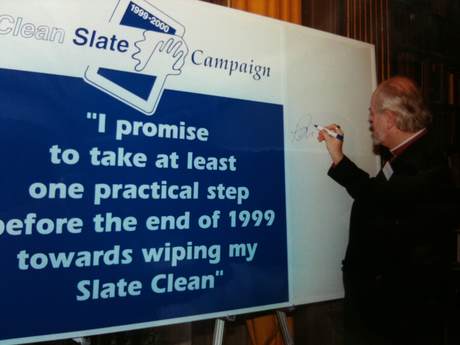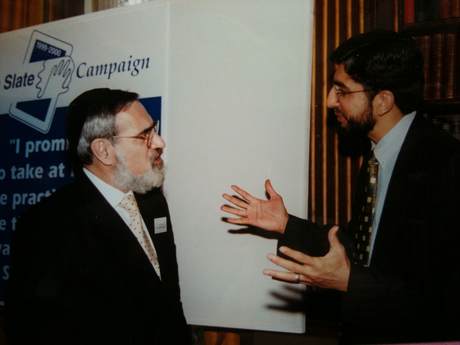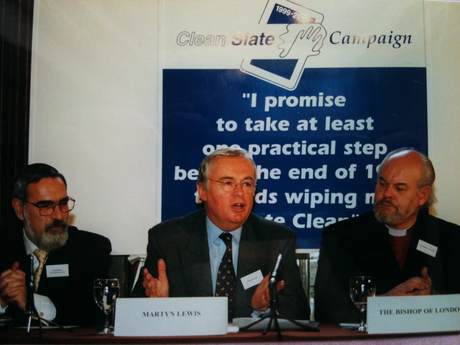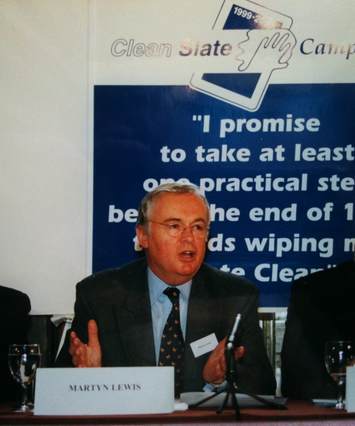Almost half the 80 patrons of the Clean Slate Campaign gathered on December 1st 1999, to endorse the idea of using the approaching new millennium as an opportunity for a fresh start - personally and collectively. In London's appropriately-named Reform Club, and by telephone link in Belfast, Cardiff and Edinburgh, religious and political leaders, sporting figures, media personalities and people from all walks of ordinary life, gave their support. The conversation was chaired by former BBC news presenter Martyn Lewis. This report gives extracts from the contributions by some of the main speakers.
The Rt Rev. and Rt Hon. Richard Chartres, Bishop of London
I support this campaign for the reason that it is a very simple idea which nevertheless expresses a deep spiritual truth. And that truth is that when you put something right in your life, when you forgive, you release a great deal of energy and defuse tension.
Christians, of course, are coming up to the celebration of the great jubilee year of 2000 and right at the centre of that jubilee year is the idea that the rich nations of the world should cancel the unpayable debts of some of the poorest nations of the world. That's one way of embodying this simple 'wipe the slate clean' campaign theme. But we shouldn't just point the finger at other people and demand that they take action. If there is to be a real change, a real revolution, as always it has to begin with me and with us. It's extraordinarily important that we all recognise our personal role in making sure that the world is a much more peaceful and constructive place for the next millennium.
One action can reverberate infinitely. I hope very much that as people quietly take action themselves and reflect on this campaign they'll see the importance of reverberation, of goodness and moral action.
It's good to be sharing this initiative with so many representatives of the great world faiths.
Chief Rabbi Dr Jonathan Sacks
This is a wonderful idea, which of course I warm to, and we all do in the Jewish community because it's the kind of thing we try to do. Each Jewish New Year, between New Year and the Day of Atonement, we say sorry to people we've offended and we try and make amends to those we've harmed. Sometimes, of course, it can be very difficult.
There is too much pain in this world and the most tragic - because it is the most avoidable - is the pain that we cause one another. And how simple it is to undo it by simple words, by saying sorry, by saying thank you, by saying "I was wrong", by saying "Forgive me". At the heart of Clean Slate is a profound idea also at the heart of so many of our faith traditions. It is never too late to mend relationships that have been broken or never too late to heal people we have harmed. It is never too late. It is never too soon.
When many of us begin to change ourselves, together we begin to change the world.
Iqbal Sacranie, Secretary General of the Muslim Council of Britain
This is a very simple message, but a very powerful one. I'm sure that many of us, particularly those of us who come from Africa, remember that in school we used to have slates, and we used to wipe them clean several times a day.
As human beings we are prone to cause harm and anguish. At this time, when we are looking forward to how we can better participate together in society, the best way would be to accept one's own faults, to amend them. To take the initiative of trying to correct ourselves in very simple ways. I am honoured to be part of this campaign and I am sure its message will go across the country, across the nation
Cardinal Cahal Daly, former Roman Catholic Archbishop of Armagh and Primate of All Ireland (speaking from Belfast)
The Clean Slate Campaign might have been designed for us in Northern Ireland because we are engaged in a historic attempt to begin the new millennium with a new and clean slate. I feel the hand of God has been in this campaign. All of our great religious traditions, all the great world religions, give a central place to sorrow, repentance, forgiveness, reconciliation - and all these are central to the Clean Slate Campaign.
The Duke of Montrose (speaking from Edinburgh)
This is a great opportunity for Scotland. The basic principles of the Clean Slate Campaign could give Scotland a fresh start with our new Parliament and a new millennium. It is one way to cure the nagging bitterness that has dogged so many of us and contributed to a habit of blaming others. On a day like this when we hear from Ireland of what they are facing and when so many hurts will have to be forgiven and healed there, it does give a good perspective for us in Scotland to think that the Scots could show the Irish what is possible.
Nia Rhosier, General Secretary, Fellowship of Reconciliation in Wales (speaking from Cardiff)
This simple idea, if taken really seriously, could have such beneficial consequences. We in Wales are very much aware of the importance of discarding a lot of baggage and of facing the pain of history with courage. But having cleaned our slates, we must be ready with new ideas and attitudes to take us forward. I've been involved in the ministry of reconciliation and I'm finding the campaign a valuable asset in my work.
Ann Widdecombe MP, Shadow Home Secretary
One very significant patron who gave a lot of backing to this campaign and who sadly is not here today was Cardinal Basil Hume. I am tremendously grateful for the way that he did decide that the Catholic Church should play a full role in this initiative.
I think a lot of us in Parliament who have faith have become increasingly concerned at the way that the millennium appears to be completely divorced from the spiritual message that should be going with it. At the same time, we wanted a way forward that could embrace those of all faiths and none. So that we could all join together in a significant act to recognise the millennium.
When the new year comes, we all make resolutions. That always concerns some amendment of conduct for the future - normally broken in February and forgotten by March. But this seems to me different because it means not promising oneself that one would do something, but obliging oneself actually to do something.
The Rt Hon David Blunkett MP, Secretary of State for Education
In a message: "I am very sorry that I cannot attend your event today, but I would like to take this opportunity to wish the Clean Slate Campaign every success. I am very happy to support this excellent initiative. Everyone can think of something that they either should have done, or should not have done, and the Clean Slate Campaign provides an opportunity not only to start afresh, but to learn from the past and behave differently in the future. I hope that as many people as possible can begin the new Millennium by 'wiping the slate clean'."
Lord Alton of Liverpool
He stressed that wiping the slate clean was not just a personal matter. He said that the 99 members of Liverpool City Council, in an unprecedented unanimous vote, had just passed a resolution acknowledging and expressing regret for the city's three centuries of involvement in the slave trade.
Martyn Lewis
I think the attraction of it is that it is such an incredibly simple, straight-forward, easy-to-execute idea. The Clean Slate Campaign means saying you're sorry, it means mending fences, it means doing something that you might not otherwise have done if something like this had not been here to give you that nudge.
There has been a very powerful message of reconciliation here today. A real frisson went through me when I realised how many of our religious leaders are here today, speaking with one voice, and how powerful that is. There is a clear opportunity here for people to do things in a very private, personal way which will help them as individuals, and ultimately help to make the towns and cities in which they live, the country in which they live, a better place.
English




